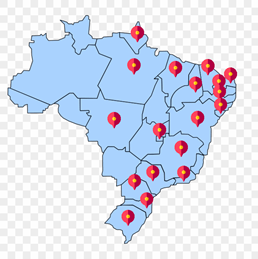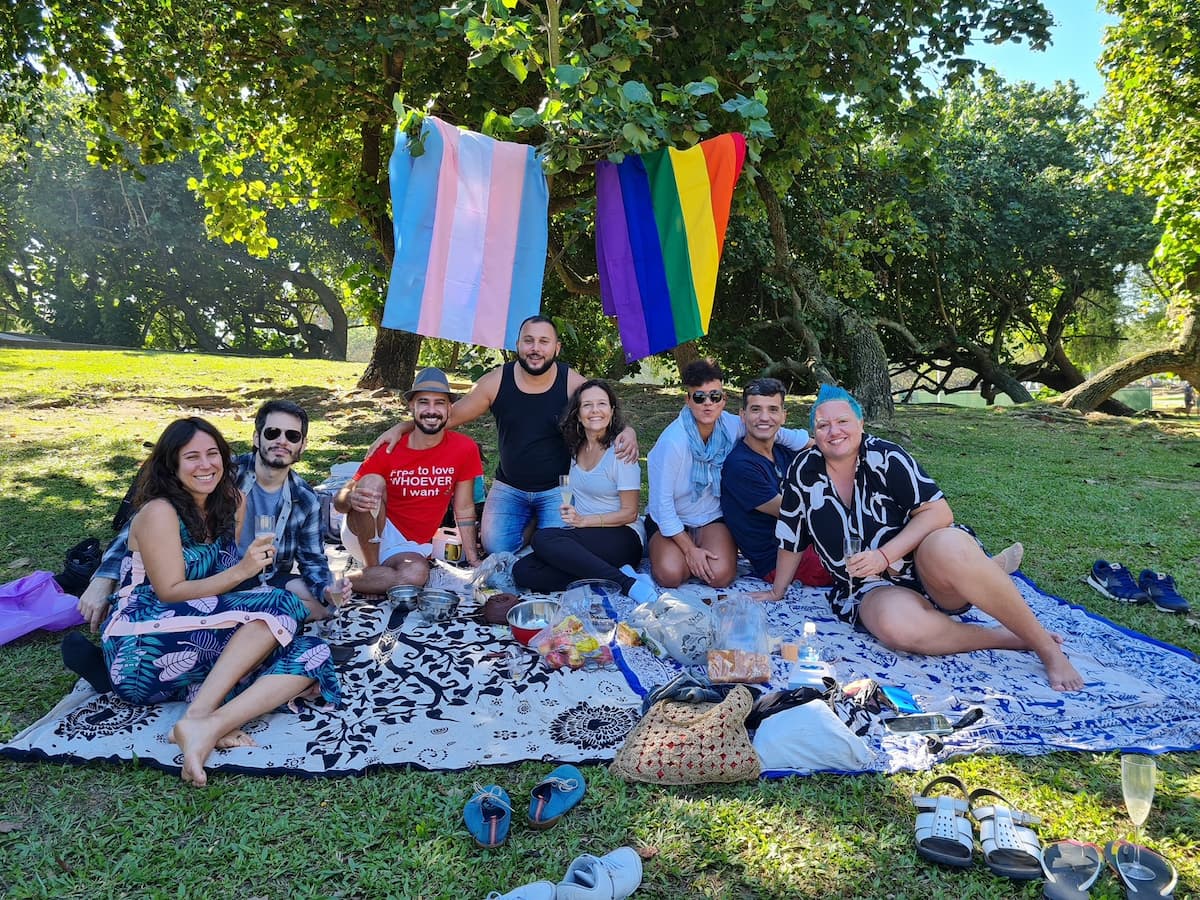Between April and July 2021, Micro Rainbow International Foundation (MRIF) held its 8th small business training for low-income lesbian, gay, bisexual, trans and intersex people (LGBTI) in Brazil, thanks to the financial support of Euromonitor International. Due to the pandemic, the training was once again held online, this time with 45 students (20 more than in the previous training) from all over the country, as the map below shows.

A total of 37 completed the training, a rate of 90% graduating. In quantitative terms, this number was a record, especially considering it was the first time that we held the training nationally with a much larger group and given the adverse political and socioeconomic conditions in Brazil. For comparison purposes, the 7th training, which had only 25 students, had a completion rate of 83%.
As part of this training, we awarded six students with seed capital to invest in their business. Their business plans stood out demonstrating high levels of business management and financial projection, as well as strong commitment and engagement throughout the training.
Positive results despite Covid
28 participants presented their business plans before an examination board (75%) and 24 submitted written plans (64%). These results are deemed satisfactory since part of the students who were unable to present or submit their plans were very committed and engaged throughout the training. However, due to Covid‑19 infection or loss of close relatives because of Covid, they could not finalise their plans. Other critical cases included a student who was battling cancer and another one who became homeless during the training. This is a very different scenario in comparison to the previous trainings, when the reasons for dropping out or not finishing a business plan were mostly because participants had found employment opportunities or were not ready to start a business.
The quality of the business plans and presentations was well above average and most of them contained well-prepared financial projections, including precise figures and definitions. This reflects these students’ dedication and efforts during the training and indicates significant learning in the financial area, which has always been the biggest stumbling block in previous trainings. All students who submitted their plans reported feeling more confident about their business, regardless of how advanced they were.
Regarding the more immediate impact of the training, 17 participants (46% of graduates) reported expansion of their business, including increases in services, sales and income; 11 participants (29%) are still planning or restructuring their businesses, including those whose businesses was paralyzed or suffering serious restrictions due to sanitary measures and social distancing (musicians, DJs, ceremonialists and artists in general). Nine participants (24% of graduates) did not report any immediate impact on their businesses, either because they have been facing serious physical or mental health issues or because they had to temporarily suspend their entrepreneurial activities to dedicate to formal employment due to acute financial need.
Increasing networks for LGBTI entrepreneurs across the country
It is important to highlight that holding an online training allowed us to reach participants from all 5 regions of the country, including those living in remote and conservative locations, where there were no support networks or projects geared towards LGBTI people. Another very positive result of the training was the establishment of personal and professional networks among participants. There was strong interaction among them on social media, creating powerful resources for the dissemination of their work, knowledge exchange and mutual support. This result was also observed in previous trainings, but the geographic and sociocultural diversity in this training enabled participants to make friends and professional partnerships from different regions and experiences who would never have connected in other circumstances. This could be seen as one of the greatest achievements of the 8th training.
For most participants, our training meant more than an upskilling opportunity, but a chance to change the course of their lives, improve their mental health and become more empowered. Such positive impacts were particularly significant considering the alarming number of participants who were hopeless, depressed and lacked social protection networks prior to the training.
“Every time we started a class and I heard your voices my mood would change. I felt welcomed, special. During the week I had Covid I was really weak, vulnerable and very scared. I didn’t sleep well for days and I know it’s not cool, but during class I turned off the camera and felt such a peace… Listening to you all soothed me and made me realise I was still standing strong, even though I felt scared. The other students and staff were a real healing.” (Andressa Santalucia)
“I want to express my eternal gratitude to the entire Micro Rainbow team for your affection and care, for the amazing classes… as I often said during the training, you are my antidepressant…my prescription drug. Thank you for everything, you have changed our lives! I have been rethinking everything in my professional life thanks to you guys.” (Fernando Mafiolette Marçal)
“I want to thank everyone on the Micro Rainbow team. The training came at a very special moment for me, a moment of transformation…. It was surreal to be able to participate in the classes and plan a future at such a dark time for humanity, especially in our country. Each class was like disconnecting from everything and finding new strength.” (Edilene Junger)
“I certainly see everything with more maturity and realism. Before the training, I had to research on my own how to calculate and manage my business. Nowadays, after everything I learnt from you, I believe in my business, in the person I am and in the potential of the knowledge that we shared in the classes. I can better determine what I need to have in stock, what to do with my income, how to deal with my employees and mainly, I know my business, I didn’t give up and that motivated me to continue.” (anonymous)
Achieving such results in a time when the country is going through its worst economic depression in decades and facing a terrible mismanagement of the pandemic can be seen as an accomplishment for the LGBTI community in Brazil. It also shows how powerful our work can be in terms of giving hope to low-income LGBTI entrepreneurs.

